10 ways to delete applications on Windows computers, fastest to uninstall Windows software
Many of you know how to install software on your computer but do not know how to remove software from your computer. To delete applications on your computer is very simple and there are many different ways to do it such as uninstalling from Control Panel, using the software's built-in uninstaller, using 3rd party application uninstaller software. Let's learn more about how to do it in the section below.
1. Uninstall the software from Control Panel
This is the most popular method and is used by most Windows users. The advantage of this solution is that software can be removed quickly and easily from one place. The downside is that it can only uninstall applications that you install using .exe, .msi files. downloaded from software download websites, but cannot uninstall applications downloaded from the Windows Store on Windows 10, Windows 8. / Windows 8.1 .
To do this, access the Control Panel > Programs > Programs and Features menu . On Windows 10, go to Control Panel and you will see Programs and Features without having to go to Programs.

In the Programs and Features window, double click on the name of the program or utility you want to remove from the system, or right click on the name and select Uninstall and follow the instructions.

2. Uninstall the program using Uninstall shortcuts
Most desktop programs, after installation, will create a shortcut named Uninstall . The name of this Uninstall file will also appear in the program's folder on the Start menu ( in Windows Vista, Windows 7 ) or Start screen ( in Windows 8/Windows 8.1 ).

To uninstall any program, you need to select the correct file named Uninstall of that program to remove the program/utility from the system.
3. Uninstall using the program's Uninstall.exe file
Many programs ( especially those that create the Uninstall shortcut ) will have an executable file named uninstall.exe . This file is always found in the installation directory of that program/utility.

Sometimes this uninstaller's name is abbreviated, perhaps uninst.exe as shown below:

Just double-click the uninstall.exe file in the program's installation folder and follow the necessary steps to uninstall the program from the system.
4. Uninstall the program using the MSI installation file
Some programs ( like the 64-bit version of 7 Zip ) will not use the setup.exe file for installation. Instead, the installation file will have the extension '*.msi'. This format is used by Windows Installer , a special installation format reserved by Microsoft for its Windows operating system.

Therefore, installation files of the form ' *.msi " will be easy to uninstall by right-clicking on the file and selecting the Uninstall command .
Removing programs from the system from msi files can also be enabled from the command line. By activating the Command Prompt feature with admin rights and then entering the command " msiexec /x " followed by the name of the file as shown in the image below.
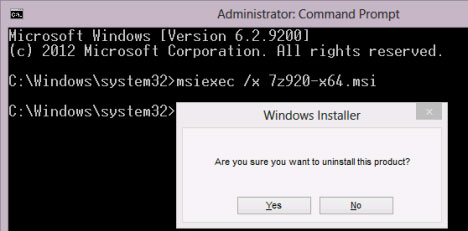
5. Uninstall applications installed from Microsoft Store and programs from the Start screen
All of the above methods are mostly used only for desktop environment programs. If you want to remove applications from the Start screen, you must do the following:
Right-click or hold down on the tile of the application on the Start screen that needs to be removed. A menu will appear at the bottom of the screen, just click the Uninstall button. Immediately the application will be removed from the system. In case the application you want to remove no longer has tiles on the Start screen, simply search for the application name and then right-click or click and hold on the tile name in the search results then click Uninstall .
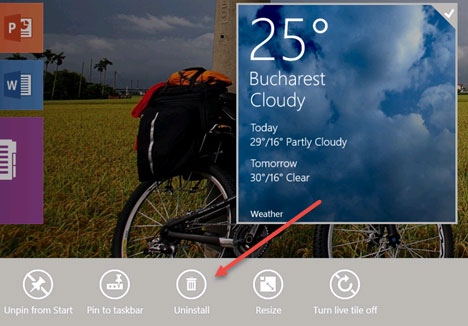
For computers without a touch screen, Windows 8.1 will display a traditional right-click menu when right-clicking on the Modern application tile, then selecting the Uninstall command to remove that application.
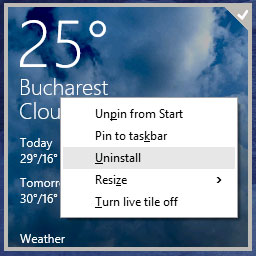
You can also perform similar steps with desktop-side software that displays in the Start screen. However, when selecting the Uninstall command, Windows 8.1 will switch to the Programs and Features window in Control Panel, from which the software can be uninstalled.
With Windows 10, you can uninstall software from the Start menu very quickly, click on the Start menu, scroll down to browse the list of applications and find the one you want to uninstall, right click on the application select Uninstall, then follow Uninstallation instructions are fine.
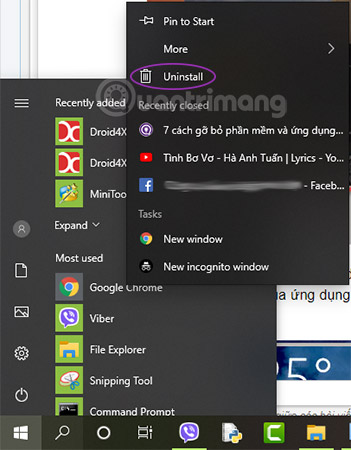
On Windows 11, you can also right-click the application icon in the Start Menu and select Uninstall to uninstall it.
6. Uninstall Modern apps from PC Settings
In Windows 8.1, you can also use PC Settings to remove Modern apps from the Windows Store. By going to PC Settings > Search and apps > App sizes .
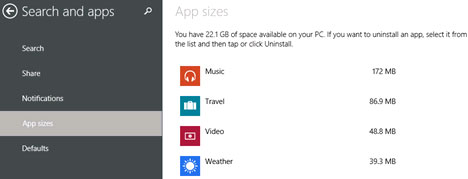
On the right side you will see a list of all applications installed on the device. Click to select the application you want to remove and then click the Uninstall button .
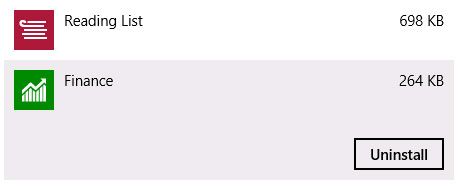
Then click the Uninstall button again to confirm the removal of the application from the system.
7. Uninstall in Apps & features
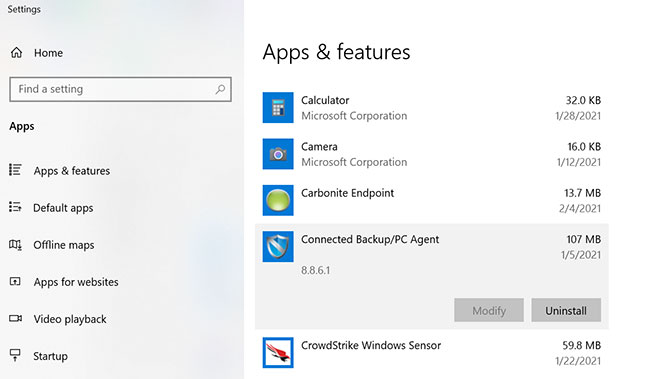
You can also go to Settings > Apps > Apps & features to easily see all the programs you can uninstall. This screen shows you both Windows Universal and standard desktop applications, so you'll find every program installed on your PC here. Scroll down the list to find the program you want to remove, then click it and select Uninstall.
8. Use the command line interface
Besides the above methods, you can absolutely use command line tools (CLI) such as Command Prompt or PowerShell on Windows to uninstall applications. Before proceeding, you need to note that Command Prompt and PowerShell are both powerful tools and you can create problems for your computer if you are not careful.
The steps are as follows:
- Open the command line tool with Admin rights
- You can find command line tools by pressing the Start button then typing Command Prompt or PowerShell then selecting open as Administrator.
- Enter the following command into the command window, replacing AppName with the name of the application you want to remove: Get-AppxPackage *AppName* | Remove-AppxPackage
- You can find a list of applications with a clear App Name by entering the following command: Get-AppxPackage | ft name, PackageFullName -AutoSize
9. Delete all pre-installed Windows software to speed up your computer
On Windows, Microsoft pre-installs a lot of different software. Most of these software are useless or rarely useful but take up a lot of system resources. These applications are often called bloadware.
Some bloadware can be removed easily, but others cannot be removed normally. If you are interested in removing bloadware to speed up your computer, you can refer to the video from TipsMake.com's YouTube channel. If you find it interesting, please like, share and sub to support:
10. Use specialized software
Applications often leave their files and settings across the entire system and can even put settings in the Registry that can be difficult to track. Windows' built-in uninstall features don't necessarily remove all of these leftover files and settings, but third-party uninstallers will do a better job of completely removing the application.
The challenge in completely removing a Windows desktop application lies in finding the right balance. Many Windows files and Registry settings are shared by many programs. Therefore, an uninstall utility needs to remove all residuals for the program you are uninstalling without taking them away from other programs that may still rely on those items.
For this reason, many of the best uninstallers have specific backups and protections in place. If problems occur after uninstallation, the app can be restored to fix any problems that appear.
There are quite a few software available that can be used to uninstall other programs. Some software is even capable of removing leftover files left over from the Windows software uninstallation process as well as other registry entries, including some prominent software such as IObit Uninstaller, Ashampoo Uninstaller, Revo Uninstaller …
The article recommends 3 third-party uninstaller programs that can get this job done. However, TipsMake also has some of the best free software uninstallation tools.
Revo Uninstaller
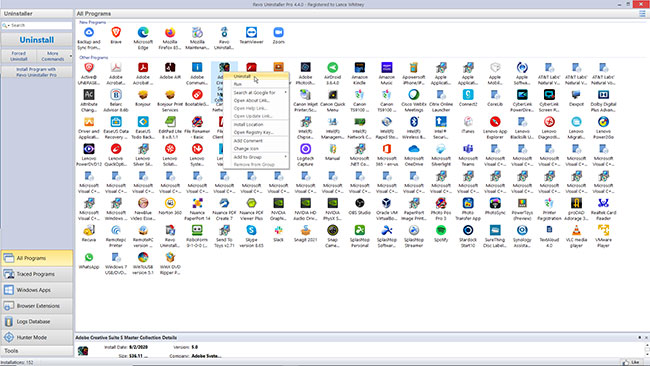
Revo Uninstaller can cleanly and completely remove desktop applications, Windows applications and even browser extensions. The free version offers basic features and can be a good place to start. For $24.95 (574,000 VND), the Pro version can remove browser extensions and the remains of uninstalled programs. Priced at $29.95 (689,000 VND), the Pro Portable version can run on many computers and from USB.
Revo Uninstaller has a simple interface, with the option to view your installed applications as a list or grid. Windows applications can be deleted on the next tab, and the Tools menu includes eight system utilities to clean up files on your computer.
Revo Uninstaller can remove previously installed programs, and the interface shows you all the applications on the system, making it easy to find the ones you want to remove. The program can even help install programs, allowing it to monitor the entire installation process for more precise application removal in the future.
Revo Uninstaller has several tools, most of which are for uninstalling software. The Uninstaller tool is very simple and besides uninstalling apps, you can use it to remove Microsoft Store apps.
Included with Uninstaller is a set of system maintenance tools, including Autorun Manager to select programs that start with Windows. All other tools are for cleaning the system: Junk Files Cleaner (cleans junk files), Browser Cleaner (cleans browsers), Microsoft Office Cleaner (cleans Microsoft Office) and Windows Cleaner (cleans Windows).
Hunter Mode of Revo Uninstaller Free is relatively unique. If you use Hunter Mode, the UI will disappear and leave a blue crosshair on the screen that you can drag around. Hovering over an app window or taskbar icon gives you detailed information about the app and uninstall options. This option is useful for tracking exactly which process is causing advertising pop-ups to appear, for example.
To remove a program with Revo, double-click the program you want to remove or right-click it and select Uninstall. First, Revo creates a restore point that you can roll back to, if it deletes more related files and registry entries than you expected. Next, Revo invokes the program's own uninstallation routine to remove it.
Revo will then scan the Registry for leftover settings and ask if you want to delete them. For this, you can choose 3 modes - Safe, Moderate or Advanced - depending on how aggressive the program you want. After that, Revo will scan the remaining files to delete them.
The Moderate option takes about 60 seconds and it searches for the most likely locations where remnants of uninstalled programs still exist. In testing, Revo Uninstaller found a number of registry entries and files that needed to be deleted. It also found a few false positives, so you need to check each entry to make sure you really want to remove them.
IObit Uninstaller
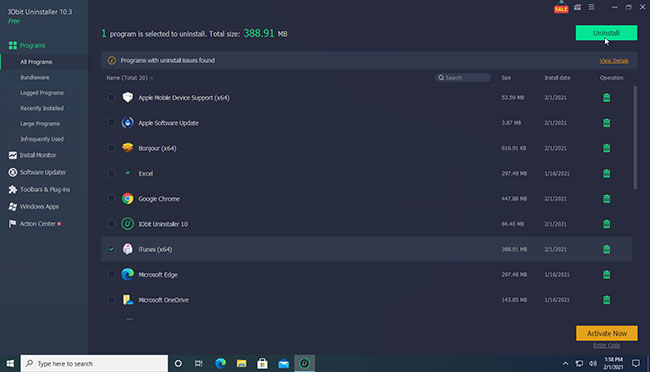
IObit Uninstaller can remove desktop and Windows Universal applications. The free version offers basic features, such as the ability to scan for leftovers of an uninstalled program. Priced at $19.99 (460,000 VND)/year, the Pro version is suitable for 3 PCs and has more features, such as support for stubborn programs and browser plug-ins.
IObit Uninstaller's main screen offers multiple views and options. You can see all installed programs, recently installed programs, large programs that take up a lot of space, and infrequently used programs. The screen also points you to Windows applications and browser plug-ins. There's even a section for software updates where you can check to see if your program is up to date.
To use IObit Uninstaller, select the program you want to remove and then click the Uninstall button. IObit uses the program's own uninstallation process to remove it, removing any unnecessary files, registry entries, and settings along the way.
Ashampoo UnInstaller
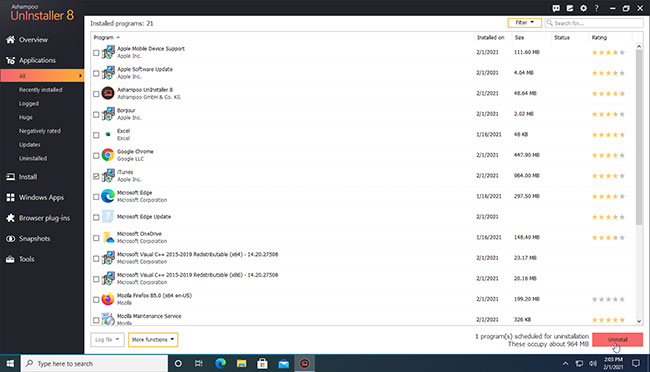
Ashampoo UnInstaller can wipe desktop applications and Windows applications without any files or settings remaining. The product sells for $21, although you can try before you buy with a 30-day free trial.
At the home screen, you can see all installed apps, recently installed programs, major apps, and even Windows updates. You can also check the list of all Windows applications and browser plug-ins. Ashampoo UnInstaller can also monitor the installation process to make uninstalling programs easier.
To try Ashampoo UnInstaller, select a program you want to remove and click the Uninstall button. You may choose to perform an additional deep cleaning to try to remove any traces of the program. The program's own uninstallation process will run, letting Ashampoo UnInstaller remove remaining Registry files and settings.